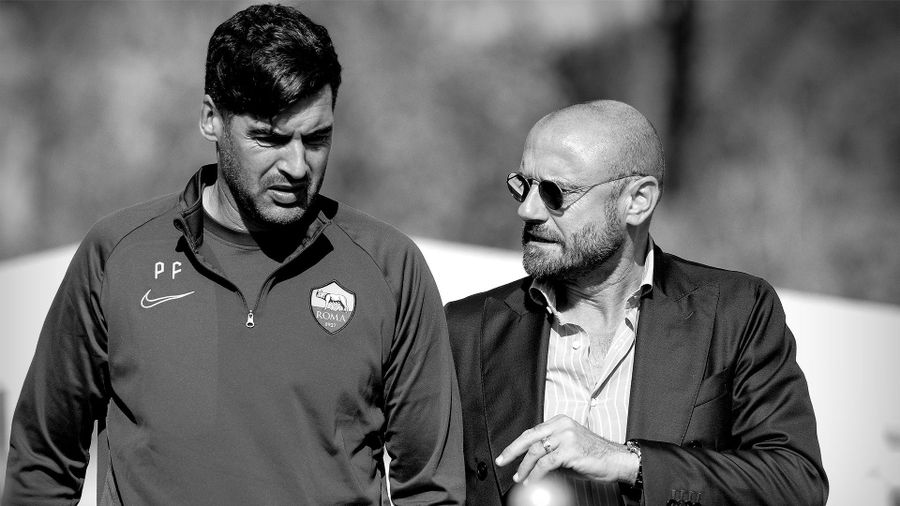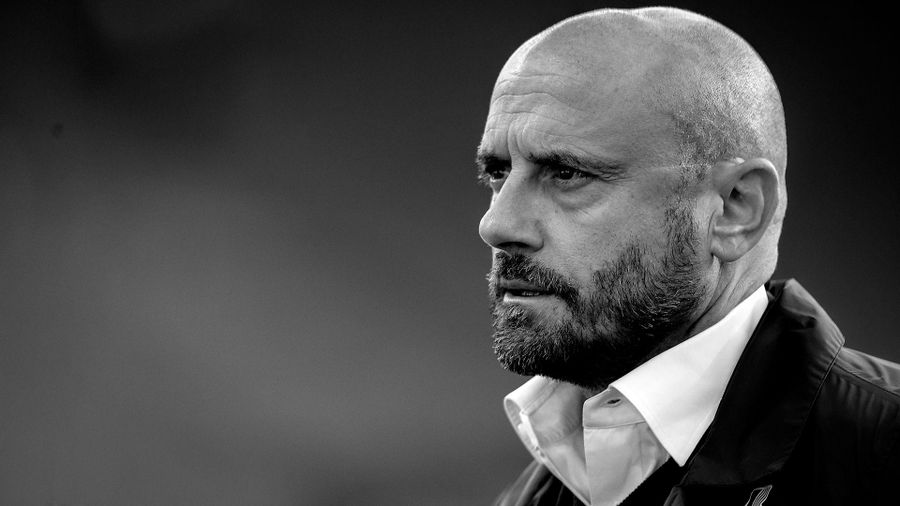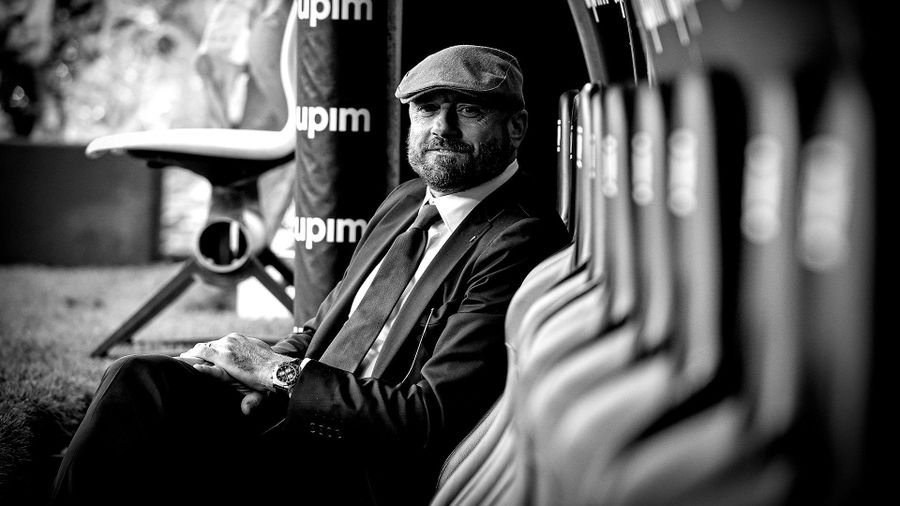

The sporting director sat down with asroma.com to discuss the relationship he has already forged with coach Paulo Fonseca, his thoughts on the campaign so far, and the qualities he looks for in players - both in those already inside the dressing room, and in those he is looking to add to the group.
Here's everything Petrachi had to say.
How do you assess your first half-season at Roma?
“We’re working really hard but we still have lots to do. We have to keep doing what we’re doing and improve. One thing I have realised is that there’s a lot to work with here. We all have the possibility to make a difference in our respective spheres. And as a sporting director, that’s very important for me.”
What are the main strengths of this team?
“When I joined there were lots of players already here who couldn’t wait to make a fresh start with the new season. Lots of them were keen for a change after a difficult year. Those who didn’t feel that way moved on. Those who believed in the plans we were putting together stayed. The new guys were players we weighed up both on a technical and a personal level because we needed people with desire and enthusiasm. We needed players who saw Roma as their final destination, not a stepping stone. And those who came in had the right energy and enthusiasm. Let’s say we’ve had the ideal mix of old and new. I think we’ve created the unity of purpose the club was looking for.”
Which game do you think was the turning point? Was there a moment where you thought, ‘This is the Roma we want to see’?
“After the draw with Sampdoria, we sat down and had a long talk together – the players, the coach and myself. I think that talk helped strengthen our unity. That’s when real values came to the fore in the dressing room and the lads started to produce what we were looking for. They’re going through the season with great courage, just as the coach wants. People have started to look at Roma differently now. I have to be honest, before that moment we were neither fish nor fowl – and it was understandable really as we were still getting to know each other as a team. We needed to grow and we needed to nurture the ambition to aim higher. After the Sampdoria game, the lads started to show they’re a team. It happened after that meeting we had. They know what I’m talking about.”
Apart from the football side of things, what sort of club did you find when you joined in the summer?
“From the minute I walked through the door I was surprised by the set-up I found here. Some people thought I was crazy and said, ‘Why would you go there now?’ But once I’d heard about the plans behind this club, first from Guido Fienga and then from president Pallotta, I had no doubt and I accepted. I like to make a difference within my professional boundaries and I think people’s roles should be respected. I’ve had that at Roma, where there’s a very solid set-up. There was no need to come in and make radical changes, just minor alterations. Guido has done that at club level while I’ve focused on the football side. It’s been a gradual process of growth that we’ve all undertaken and are still on together. However, there’s still a long way to go because we must improve further.”
What sort of relationship do you have with the management?
“We all work with the same objective in mind. There’s been great collaboration whenever I’ve needed anything. I asked to have the pitches re-laid and it was done quickly with no messing around. That’s what it means to be effective, incisive, pragmatic, quick. You need that in football because talk is cheap. Here we share our ideas and doubts, what we think isn’t working and then we take action together. That’s our strength. Paulo [Fonseca], Guido Fienga, who is in constant contact with the president, and myself are all pulling in the same direction. We’re all part of the same machine.”
Paulo Fonseca has often spoken about the team’s mentality and he uses the word ‘courage’ a lot. Do you and he share the same vision?
“I’ve said this before but I’ve been totally won over by our coach. His football philosophy fits perfectly with my own. When I spoke to the players about Paulo, I told them I would have loved to have him as my coach when I was a player, Fonseca helps you to play football and enjoy yourself. He takes away the anxiety of having to perform. That’s vital. He wants his team to have the ball and win it back immediately when they lose it, to be in control of the game. Courage inevitably helps you achieve that. He wants you to concentrate on that idea and not play a different way depending on the opposition. That’s very important as a footballer.”
Would you say the coach has got his philosophy firmly inside the players’ heads now?
“Yes, I can see it in their eyes. I feel like I have a moccasin on one foot and still have a football boot on the other! When I watch the lads training, I feel as if I still have one foot on the pitch and the other is off it. That’s when I think how much I’d like to have been trained by Fonseca. You can imagine what effect his ideas have on the players, who unlike me still have both feet on the pitch.”
How much importance to do you place on ensuring the players have the right attitude on and off the pitch?
“We have a set of principles which form the basis for the work we do in my dressing room. I call it ‘my’ dressing room not because I want it to be about me, but because it’s the right word here – it really does feel like ‘my’ team in the sense that I identify with them completely. I’ve been at clubs before where I didn’t feel the team really represented me. Here I felt the coach and I were on the same wavelength instantly. Respect, discipline and professionalism are indispensable. The players know what we want and they know which rules they have to respect – we made that clear from the start. It was the first step I wanted to take. If you don’t respect the rules, you’re out.”
Have you been surprised by how well Paulo has adapted his game to Italian football?
“I was much more surprised by the way he handled pressure. There was a point in the season when we had loads of injuries at the same time – that would cause problems for anyone, not just a coach who is new to Serie A. I read interviews about other teams where they had one or two players missing and it seemed like the end of the world. We on the other hand had up to seven regular starters out at the same time. Paulo’s greatest strength has been his ability to adapt – deploying [Gianluca] Mancini in midfield, for example.”
How difficult was it not to give the players excuses at such a tricky time?
“It wasn’t easy, but Fonseca kept on instilling courage in the players. If you start feeling sorry for yourself and cursing your luck, you weaken the team. Paulo instead showed faith in players who weren’t playing much, such as [Javier] Pastore and [Davide] Santon, they sensed his confidence in them and repaid him with their performances.”
How much room for improvement is there at Roma?
“Lots of players need to improve, especially in terms of reaching peak fitness as lots of them have been unlucky with injury problems. That’s the only way you’re going to find consistency in a team. We’ve changed our line-up every game and successful teams tend to have the same seven or eight regular starters. We need to make the team even more close-knit and increase their self-belief even more – that comes with performances. If we can improve that, then perhaps we’ll pick up some more good results in crucial matches and then we’ll become fully aware that we can give anyone a game.”
What qualities do you look for in a player?
“Great confidence and humility – both are fundamental. Arrogant players who think they’re the bee’s knees have no place at Roma.”
What can we expect to see in the January transfer window?
“In January it’s always about making small adjustments, not revolutionising everything. It’s not easy. When we had that injury crisis earlier in the season we looked around at the free agents, but it was such a difficult spell that I could have got my own boots down off the peg at 50. It’s hard to improve our squad at the moment. We really believe in the group of players we have here and I don’t think much will happen in January. Of course if there’s someone who’s not very happy and wants to try his luck elsewhere, we’ll take that into consideration. I keep seeing us linked with a whole host of attackers but I want to stress that we’re happy with [Nikola] Kalinic. He’s finding form and we see that in training on a daily basis. We’re sure that he’ll be a great help in the second half of the season. The names we’re reading about aren’t true because Nikola, as far as we are concerned, is not available for transfer.”
We’ve seen Bruno Peres back in Trigoria recently. Will he join the team?
“I want to say a word about him. He’s a player I know well as I signed him for Torino. He knows how to play football; he just has to rediscover his hunger and humility that he perhaps lost a bit of recently. Paulo and I have decided to give him another chance because everyone deserves a second chance. He needs to find himself again. We all make mistakes. I saw the real Bruno Peres at Torino and I know how he did it. He knows it too. We’re going to give him a chance and if he messes up he’ll be out.”
What does a sporting director do on a daily basis?
“When the transfer window is closed I live in Trigoria and it’s like my second home. I’m totally caught up in my job. I have no problem spending all day here. Of course when I’m able to I try to take a bit of time to see the city or go home to my wife and my daughter. But I think the players should feel I’m around 24 hours a day. They can’t come up to me and say, ‘The coach never picks me’ because I can reply, ‘Have you seen yourself in training?’ They know I’m always there watching them.”
And when you’re not on the training ground, what do you do?
“When I’m not involved with the team, I focus on scouting. I have lots of people working with me and they put up with me. Every now and then I feel the need to pick out some of the players I’m most interested in and discuss them with the coach. All my choices are backed both financially by the club and technically by the coach. I’ll never sign a player Fonseca doesn’t like. We always discuss our choices.”
What about speaking to the players?
“When there’s a player I’m not particularly happy with or who needs a ticking-off, I’m always there. That’s my priority. If there’s scolding to be done, I step in. The coach is always in the know and we’re on the same page there.”
What’s matchday like for you?
“Well… it’s very intense! But I’m fully focused on my players. The coach deals with technical aspects and I concentrate on the mental side, their hunger. I’m constantly thinking about my players. I’ll give you an example: [Aleksandar] Kolarov is one of the leaders of the team and he always fires up the others and the entire dressing room before the game. Before we played SPAL I sensed that he was firing them up a bit too much because he was desperate to win the game. Then he committed that foul which led to the penalty in the first half. I walked past him as he was going back into the dressing room and he was cursing in various languages. Instinctively I hugged him and said, ‘Relax. Calm down. The others mustn’t see you like this – they need to see you’re calm.’ That’s just one small example which shows how important it is to be there alongside the lads. During the match I’m only thinking about them. I watch everything they do very closely. I rarely notice anything about our opponents – and if I do, I often end up signing him.”
Is there anyone in particular that happened with?
“[Jordan] Veretout. He kept harrying [Daniele] Baselli and then would set off again. He was so gritty and he had the technique to go with it. I thought, ‘That’s the sort of pain in the rear end I’d like to have on my team.’ Then I came to Roma and bought him because he’s exactly the sort of midfielder I like.”
Speaking of Torino, they’re our next opponents. How do you feel about facing your former club?
“I spent nine fantastic years there. I gave everything for Torino but it aged me too because I cared so much about the club. It was a great learning experience. Having been through difficulties there helps you to do well at a club like Roma because if you haven’t been through certain things before you could fall to pieces here. I left lots of players there and seeing them again will be an emotional occasion. Perhaps the reverse fixture will be more emotional because it will be like going back to my old home. On Sunday the professional side will take over. I don’t like losing; I’m ambitious. I really hate losing. I hope our players have the right attitude on Sunday.”
How difficult is it to get going again after the Christmas break?
“It’s very difficult because you never know what to expect. When you go eight or nine days without training, you lack something you have during the rest of the season. Fitness-wise, they all came back in good shape and no one messed up there. Over the coming days we’re going to be trying even harder to ensure the lads understand how important it is to start again strong. They have to realise that they mustn’t let all the compliments they’ve received go to their heads. Filling up on praise gets you nothing because it only takes two bad games and you sink back into the mud.”
If you had to pick one symbolic goal from 2019 with Roma, which would it be?
“There were lots of great goals, like [Nicolo] Zaniolo’s against Napoli which came after 22 passes I think and involved virtually the whole team. But I’m going to pick another one by Nicolo, when we beat AC Milan 2-1. It was right after the Sampdoria game I mentioned earlier and the match against Borussia when we didn’t deserve to draw. It was an important win because he made us realise that we can do it. We showed real desire to beat a good team.”
What’s surprised you most in your first months at Roma?
“If I came to Roma, it’s partly because of what I saw from the fans when I came here as an opponent. It gave me goose bumps and I used to think what it must do for the players on their team. The masses of fans I’ve seen following the team around Italy the last few months is something that should make our players proud to wear this shirt. They really made themselves heard in Florence – they were even more deafening than I thought was possible. I know Italy is going through a financial crisis at the moment and I’ve seen lots of empty seats at the Olimpico in the first part of the season, but I hope the team can make our fans proud of them and bring back the fans who have stopped coming to the stadium.”
Check out earlier entries in our Big Interview series:
AS Roma x Edin Dzeko
AS Roma x Gianluca Mancini
AS Roma x Aleksandar Kolarov
AS Roma x Nicolo Zaniolo
AS Roma x Jim Pallotta
AS Roma x Cengiz Under
AS Roma x Paulo Fonseca
AS Roma x Leonardo Spinazzola
AS Roma x Chris Smalling
AS Roma x Javier Pastore






 Tickets
Tickets
 Shop
Shop








































